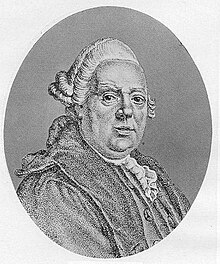David Ruhnken
| David Ruhnken | |
|---|---|

David Ruhnken
|
|
| Born | 2 January 1723 Bedlin, Province of Pomerania, Kingdom of Prussia |
| Died | 14 April 1798 (aged 75) Leiden, Batavian Republic |
David Ruhnken (2 January 1723 – 14 May 1798) was a Dutch classical scholar of German origin.
Ruhnken was born in Bedlin (today Bydlino) near Stolp, Pomerania Province, (today Słupsk, Poland). After he had attended Latin school at Königsberg (1737–1741), his parents wanted him to go in for the church, but after two years at the University of Wittenberg he determined to live the life of a scholar. At Wittenberg, Ruhnken lived in close intimacy with the two most distinguished professors, Johann Daniel Ritter and Johann Wilhelm von Berger. To them he owed a thorough grounding in ancient history and Roman antiquities and literature; and from them he learned a pure and vivid Latin style. At Wittenberg, Ruhnken also derived valuable mental training from studying mathematics and Roman law.
The only thing that made him want to leave Wittenberg was a desire to explore Greek literature. Neither at Wittenberg nor at any other German university was Greek being seriously studied at the time. It was taught to students in divinity for the sake of the Greek New Testament and the early fathers of the church. Friedrich August Wolf was the real creator of Greek scholarship in modern Germany, and Richard Porson's gibe that "the Germans in Greek are sadly to seek" had some truth in it.
Ruhnken followed the advice of his friends at Wittenberg and early in 1744 went to the University of Leiden, where, stimulated by the influence of Richard Bentley, Tiberius Hemsterhuis had founded the only real school of Greek learning on the Continent since the days of Joseph Justus Scaliger and Isaac Casaubon. Hemsterhuis and Ruhnken were close friends during the twenty-three years between Ruhnken's arrival in the Netherlands in 1743 and the death of Hemsterhuis in 1766. Ruhnken and Valckenaer were the two pupils of the great master on whom his inheritance must devolve.
...
Wikipedia
